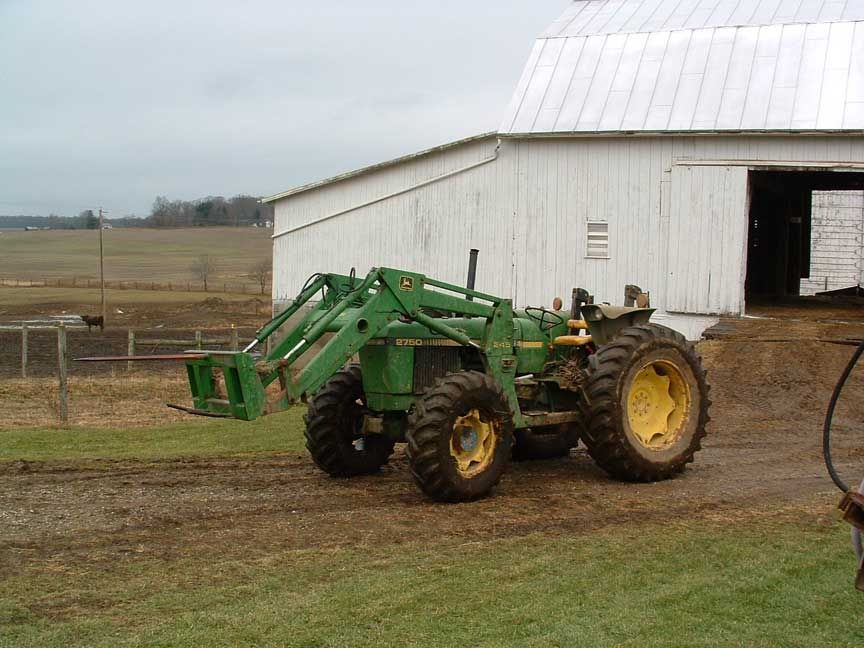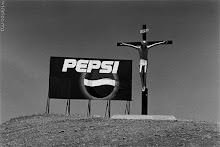Brand Whores.
Farmers are. Tractors are John Deere. That includes lawn tractors. Drills are Milwaukee. Chain saws and brushcutters and their accessories are Stihl. Wrenches are Craftsman. Tires are Goodyear. Mowers are Hesson. Mayonnaise is Hellmans. Manure spreaders are New Idea. Cars are Honda. So are three-wheelers. This is a small sampling off the top of my head of the inviolable brands of my father. Farmer-beliefs in certain brands can be well-founded and based on years of experience fighting inferior products and faulty engineering. And they can be just as mythical as thinking the Heineken tastes measurable degrees better than all other beers. I can't tell the difference yet, so I'll probably walk away from here with the same exact list of exalted brands stuck in my head.
Tractors are John Deere. That includes lawn tractors. Drills are Milwaukee. Chain saws and brushcutters and their accessories are Stihl. Wrenches are Craftsman. Tires are Goodyear. Mowers are Hesson. Mayonnaise is Hellmans. Manure spreaders are New Idea. Cars are Honda. So are three-wheelers. This is a small sampling off the top of my head of the inviolable brands of my father. Farmer-beliefs in certain brands can be well-founded and based on years of experience fighting inferior products and faulty engineering. And they can be just as mythical as thinking the Heineken tastes measurable degrees better than all other beers. I can't tell the difference yet, so I'll probably walk away from here with the same exact list of exalted brands stuck in my head.
His one failure to stick the farmer creed of choosing a brand to defend is the most obvious category of farmer argument: trucks. He simply doesn't care. They all eat too much gas and fall apart. Right now it's an old 4x4 Dodge, but not in the same way that all the neighbor's friends all drive Dodges. If Honda had built trucks in America 10 years ago, it would be no question. But no American manufacturers have yet figured out how to make long-term reliability standard.
Recently I've been putting effort forth to see if I concur with the decision to buy Stihl to cut things up. Chainsaw chains are a pain in the ass to sharpen well. So I'll put that one off till later. My dad warned me that cutting brush for more than an hour would hurt. A lot.
He was right, but only because when his shoulder straps broke in four different places, he tied two breaks together with wire and kept using the damn thing. When you trample though brush for an hour with a dead albatross hanging from your neck, you get old prematurely.
So I postponed the brushcutting too. Till today. Bought a new shoulder strap. And it works like it's supposed to.
Conclusion: Stihl is worth the extra monies when you have acres of nasty things that need to be shortened (multiflora rose, too tall children, vegetables, small trees). I have those acres.
What is 'Brush'? I suppose in the 1800s it referred to all the small growth ferns and bushes and weeds that would grow up along the hard to mow fencelines and edge of woods. Now it's just one plant, multiflora rose. If you didn't cringe when you read that, you haven't met one. It's exactly what it's Latin suggests, a member of the rose family with multiple flowers. But it's flowers are ugly. And they last for about a week. And the stemmy thorny practically tree-like stem is left for the rest of the year to stab anyone foolish enough to walk near it. It's not native to America. Some schmuck from Asia brought it over as a rose. Some knuckleheaded gov't agent told the farmers that it would make a great natural fence. So they planted it. And birds ate and pooped the seeds all over the Midwest.
I seem to have drifted off topic.
In conclusion [<---funny], farmers are brand whores. Which can at times make my life easier. Thanks advertising!
Wait, no, that's not right, I mean thanks better products!
 Tractors are John Deere. That includes lawn tractors. Drills are Milwaukee. Chain saws and brushcutters and their accessories are Stihl. Wrenches are Craftsman. Tires are Goodyear. Mowers are Hesson. Mayonnaise is Hellmans. Manure spreaders are New Idea. Cars are Honda. So are three-wheelers. This is a small sampling off the top of my head of the inviolable brands of my father. Farmer-beliefs in certain brands can be well-founded and based on years of experience fighting inferior products and faulty engineering. And they can be just as mythical as thinking the Heineken tastes measurable degrees better than all other beers. I can't tell the difference yet, so I'll probably walk away from here with the same exact list of exalted brands stuck in my head.
Tractors are John Deere. That includes lawn tractors. Drills are Milwaukee. Chain saws and brushcutters and their accessories are Stihl. Wrenches are Craftsman. Tires are Goodyear. Mowers are Hesson. Mayonnaise is Hellmans. Manure spreaders are New Idea. Cars are Honda. So are three-wheelers. This is a small sampling off the top of my head of the inviolable brands of my father. Farmer-beliefs in certain brands can be well-founded and based on years of experience fighting inferior products and faulty engineering. And they can be just as mythical as thinking the Heineken tastes measurable degrees better than all other beers. I can't tell the difference yet, so I'll probably walk away from here with the same exact list of exalted brands stuck in my head.His one failure to stick the farmer creed of choosing a brand to defend is the most obvious category of farmer argument: trucks. He simply doesn't care. They all eat too much gas and fall apart. Right now it's an old 4x4 Dodge, but not in the same way that all the neighbor's friends all drive Dodges. If Honda had built trucks in America 10 years ago, it would be no question. But no American manufacturers have yet figured out how to make long-term reliability standard.
Recently I've been putting effort forth to see if I concur with the decision to buy Stihl to cut things up. Chainsaw chains are a pain in the ass to sharpen well. So I'll put that one off till later. My dad warned me that cutting brush for more than an hour would hurt. A lot.
He was right, but only because when his shoulder straps broke in four different places, he tied two breaks together with wire and kept using the damn thing. When you trample though brush for an hour with a dead albatross hanging from your neck, you get old prematurely.
So I postponed the brushcutting too. Till today. Bought a new shoulder strap. And it works like it's supposed to.
Conclusion: Stihl is worth the extra monies when you have acres of nasty things that need to be shortened (multiflora rose, too tall children, vegetables, small trees). I have those acres.
What is 'Brush'? I suppose in the 1800s it referred to all the small growth ferns and bushes and weeds that would grow up along the hard to mow fencelines and edge of woods. Now it's just one plant, multiflora rose. If you didn't cringe when you read that, you haven't met one. It's exactly what it's Latin suggests, a member of the rose family with multiple flowers. But it's flowers are ugly. And they last for about a week. And the stemmy thorny practically tree-like stem is left for the rest of the year to stab anyone foolish enough to walk near it. It's not native to America. Some schmuck from Asia brought it over as a rose. Some knuckleheaded gov't agent told the farmers that it would make a great natural fence. So they planted it. And birds ate and pooped the seeds all over the Midwest.
I seem to have drifted off topic.
In conclusion [<---funny], farmers are brand whores. Which can at times make my life easier. Thanks advertising!
Wait, no, that's not right, I mean thanks better products!

6 Comments:
drew- Although appreciate the link, must I be under the category BADNESS?
So with all the Johny Appleseed talk in the last post; do you have apple trees around?
how about some more learning:
the infamous multiflora rose was brought to Ohio by Louis Brumfiel, famous proprietor of Malabar Farm up near Mansfield. On a European tour (not asian) he came across the plant being used as a natural fence and thought how perfect it would be for Ohio. Problems with his assumption: 1. the area in France were it grows has poor soils, Ohio has rich clays which support anything, 2. the European landscape is almost completely occupied by people or animals, no open areas where the stuff could spread, 3. goats love it, we do not have goats, and 4. even now they have these enormous bush-hog type mowers on telescopic arms on the back of their tractors that must mow the hedge rows on a yearly basis- they hate it too!
Moral of the story- do not bring foreign flora or fauna into an ecosystem where it does not belong! Wish someone had thought of that before they imported those damn asian beatles.
If you find a decendany of Louis Brumfiel, punch him in the nose for me.
Here endeth the lesson.
deo volente,
Bradley
My gosh Brad... what don't you know?
Where do you learn such things? When I google Louis Brumfield and rose I find only one page that isn't the story of a ghost. And it only says that he had multiflora rose as natural fencing.
Every other site insits it came to America before Malabar existed, as rootstock for roses, in 1886 and from Japan.
There are three types of bad rose growing on our property. Multiflora rose, scotch rose, and a third I have not yet identified.
Steven, we don't have any apple trees left. We do have a field that is called the orchard beacuse it used to be, though.
Ok his name was Louis Bromfield. He was an author, and a drunk. He bought Malabar Farm and did farming/conservation/environmental experiments. A big thing he is credited for is the whole contour farming scene. He did bring multiflower rose to the area and he soon realized he fucked up but his money and his farm continue to do a lot of research and goodness for farming and the environment. Malabar is close to where Kate Funston used to live. It is also where Sara F had her wedding reception.
With everyone being academic, I'll chime in with some information about the Albatross. While they can have the largest wingspan of any bird (~12ft) and the most secondary flight feathers (40 per wing, and 11 primaries), they are not all too heavy. The average adult weighs about 6kg, with members of the diomedea exulans group setting Albatross records in the 8-12kg range. This is a far cry from, say, the Ostrich at 156.8kg. Certainly the mass of your chainsaw and the implication of your hyperbole outweight an Albatross significantly, Drew.
Post a Comment
<< Home